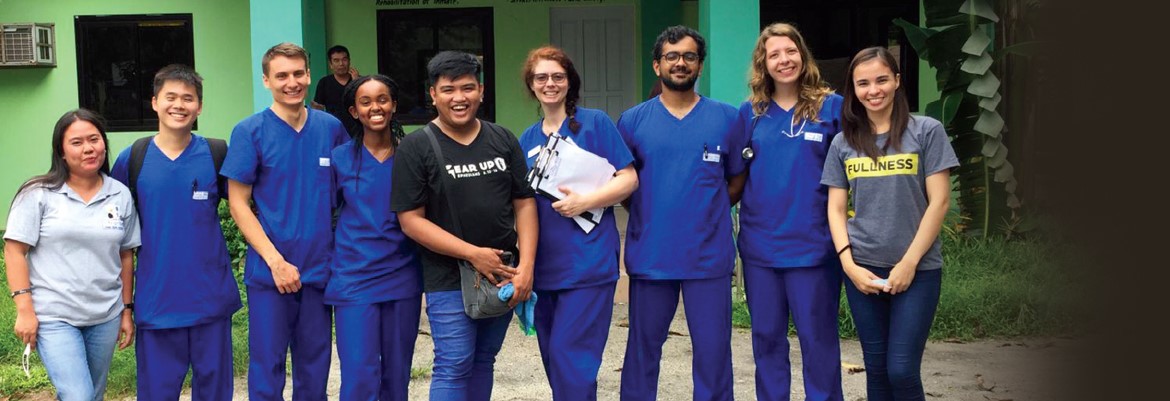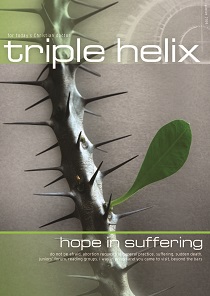'The Lord looked down from his sanctuary on high, from heaven he viewed the earth to hear the groans of the prisoners and release those condemned to death.' (Psalm 102:19-20)
No one knows how many prisoners there were back when the psalmist penned these lines, but today God hears the cries of over 11 million souls. (1) The offender healthcare field is humongous but the workers are few indeed. (2) That said, it's been nice in recent years to have several CMF members join the UK secure environment healthcare professional community. New recruits often ask me how I ended up 'behind bars'. It's been quite a journey...
As medical students, my husband Mark and I knew that God might be calling us to some sort of medical missionary life. But which speciality and where? So, we didn't rush overseas: I started training in orthopaedics whilst Mark combined general practice training with work as CMF's Head of Student Ministries. (3)
Our life changed, as the new millennium dawned, with the arrival of a child who turned out to have special needs. I needed more flexibility and so switched to general practice. After a gloriously easy registrar year in an affluent middle-class practice, I launched out into life as a London locum. One of my first jobs was as sabbatical cover in a rundown housing estate: the practice waiting room had a security guard and dual diagnoses ran rife during dysfunctional consultations. It was a stereotypical 'locum hell' but for some reason, I fell head over heels in love with the patient group.
Upon his return from sabbatical, the GP I'd been covering for told me about his work as a police surgeon. (4) Would I like to try my hand working behind bars? I remember my first shift working for the Metropolitan Police like it was yesterday: my heart was home! And so my career moved behind bars. I went on to work for three other police forces including a humbling time as a child & adult sexual offence examiner. I developed a special interest in forensic mental health, delivering primary care in three forensic psychiatric hospitals.
I have cared for prisoners in young offender institutions and local and high security prisons around the UK. Every shift is demanding yet different, but I have peace in knowing that I am where God wants me to be. Funnily enough, there's a lot of minor surgery and orthopaedics in offender healthcare - so those early years weren't wasted!
Nightmare
In 2012, a CMF psychiatrist and Mark and I started a company with the intention of providing non-profit police healthcare. God though had other plans: almost immediately, we found ourselves running the GP service for a high security prison - not a police station. Suddenly we had a lot of money coming into our not-for-profit concern. We needed to find a way of spending it. What were we to do? And then I started having a recurring nightmare:
I'm thirsty, so very thirsty. Hungry too. It's scorching hot, stiflingly humid and the faecal stench makes me retch. I crave fresh air, but my small cell is so dark with only a chink of light coming from bars high above me. And where are my clothes? I'm wearing just sweat and blood. Everywhere hurts. I'm feverish and sick too. 'Help!' I need help but no one comes to open the heavy steel door. I cry again, 'Help! Help!' Eventually I hear footsteps, but they are attached to an angry voice. The door opens and I cower in fear.
I'm not much of a visions-before-breakfast Christian and so didn't give this nightmare much deep thought. Mark, though, wondered whether it might mean something. Then my prayerful mother told us to watch a documentary she'd seen about life in a Siberian prison. The conditions and substandard medicine on display there got us thinking: how many countries in the world provide decent, if any, healthcare for their prisoners? The answer: well under a third. Prisoners typically do not receive equivalent medical care to their non-detained countrymen. Many states don't see a need to provide any offender healthcare at all. How many NGOs, Christian or otherwise, are wholly dedicated to prisoners' holistic medical needs? The answer: none that we could find clear evidence of on the internet.
Heart
And so Integritas Healthcare's mandate became clear. (5) We are a Christian faith-inspired NGO with a heart for detainees. Operating commercially in High Income Countries (HICs) and on a humanitarian basis in Low and Middle-Income Countries (LMICs), we provide Healthcare, Expertise, Advocacy, Research and Training for and about offender healthcare. Some of our work is too sensitive to discuss publicly but in a nutshell:
- Healthcare: We provide holistic healthcare for detainees and their dependents. The word 'holistic' is important because we believe that sharing the good news of the gospel is a key component to making someone whole. We have two bases in the Philippines, a country where imprisonment can be extremely grim. We have local staff and volunteer students, and trainee and senior healthcare professionals from HICs, including CMF members. (6)
- Expertise: We have acquired a degree of expertise about torture and ill-treatment. Torture is an evil about which our safe Western culture has become blasé, thanks no doubt to scenes of James Bond being tortured in the morning, before saving the world in the afternoon and taking a beautiful woman out to dinner! But the reality of torture is dirty and devastating. Examining torture victims is harrowing enough. But try to imagine being in their shoes - perhaps still in pain, probably reliving their ordeal through flashbacks, and trapped in a place where they could endure more of the same, at any time. My nightmare comes back to mind.
- Advocacy: Many prisoners are falsely accused and have done nothing other than to get on the wrong side of someone with more money and power. Others are imprisoned, tortured and even executed for following their faith. In countries where corruption is rife and lawyers cost more than a poor person earns in a lifetime, the majority cannot attain justice. We are inspired by the amazing work of the big hitting advocacy NGOs such as International Justice Mission (7) and Amnesty International. (8) For us though, day-to-day advocacy cases are less high profile: trying to prevent a prisoner being beaten again; appealing for medicine to reach the actual prisoner we prescribed it for; and petitioning for a mentally ill prisoner to be moved out of solitary confinement - a place he'd been put into purely because he was mentally ill.
- Research: We are now into our fifth year of an exciting partnership with a UK university's BSc & MSc programmes in International Health. They provide the researchers who graft, write reports and get degrees. We provide the field and expertise and get polished reports with which to improve our service delivery. Subjects covered so far include female prisoners' understanding of HIV and perceptions of mental illness.
- Training: We love teaching healthcare students about offender healthcare. We have developed 'Medics & Justice', a special study course for a UK medical school. We host increasing numbers of elective students, including CMF members, in the Philippines. We are rolling out 'Beyond the Bars', a training programme to help prisoners manage their various illnesses.
Challenges
Seven years on, we are just getting started. We give thanks to God for his continual protection during many difficult and - on occasion - dangerous times. We have experienced aggressive hacking, extortion attempts, LMIC corruption, personal safety threats, poor NHS cash flow, prison gang intimidation and most recently my assistant's near-death-by-jellyfish. But let me finish by recounting an early challenge that still makes my heart-for-women-prisoners palpate.
The monsoon was in full swing, but thankfully the jail was on higher ground. But getting into the women's section where we were due to start work required a walk through a lowered walkway, which was submerged in poo water. We could not get through, certainly not without endangering both our health and expensive medical kit. Disappointed, we turned to leave. But our would-be patients called us back: they plunged up to their waists in the stinking water, placing stacks of chairs as makeshift stepping stones. And so, humbled by these desperate women's determination to receive the healthcare we offered, we stepped across the flood water and ran our first ever female prisoners' humanitarian clinic.
The tourist agents are right: 'It's more fun in the Philippines!' (9) But actually, offender healthcare anywhere can be tremendous fun - not to mention rewarding. Why not come and join us? (10)
Rachael Pickering is Medical Director of Integritas Healthcare. [email protected]
































